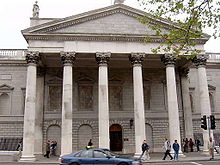List of Acts of the Parliament of Ireland
| Parliament of the Kingdom of Ireland | |
|---|---|

|
|
| Type | |
| Type | |
| Houses |
House of Lords House of Commons |
| History | |
| Established | 1297 |
| Disbanded | 31 December 1800 |
| Succeeded by | Parliament of the United Kingdom |
| Leadership | |
|
The Earl of Clare
Since 1789 |
|
|
John Foster
Since 1785 |
|
| Elections | |
| Ennoblement by the monarch or inheritance of a peerage | |
| First past the post with limited suffrage | |
| Meeting place | |
 |
|
| Irish Houses of Parliament, Dublin | |
| Footnotes | |
|
See also: Parliament of Great Britain |
|
The Parliament of Ireland was a legislature that existed in Dublin from 1297 until 1800. It comprised two chambers: the House of Commons and the House of Lords. The House of Lords consisted of members of the Irish peerage and the bishops (after the Reformation, Church of Ireland bishops), while the Commons was directly elected, albeit on a very restricted franchise.
The main purpose of parliament was to approve taxes that were then levied by and for the Lordship of Ireland. Those who would pay the bulk of taxation, the clergy, merchants and landowners, naturally comprised the members. In 1541 the parliament voted to create the Kingdom of Ireland.
Over the centuries, the Irish parliament met in a number of locations both inside and outside Dublin - the first place of definitive date and place was the FitzGerald stronghold at Kilkea Castle near Castledermot, County Kildare on 18 June 1264 some months earlier than the first English Parliament containing representatives of towns and cities. However, this Irish Parliament was a meeting of Irish nobles and bishops, not representatives of Irish people. Later, in the 15th century, Irish parliaments began to invite representatives of the people.
Among its most famous meeting places were Dublin Castle, the Bluecoat School, Chichester House and, its final permanent home, the Irish Parliament House in College Green.
...
Wikipedia
